Displaying items by tag: Peter Malone's Movie Reviews
Carga Maxima/Overhaul
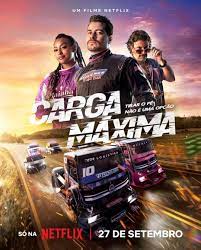
CARGA MAXIMA/ OVERHAUL
Brazil, 2023, 95 minutes, Colour.
Thiago Martins, Raphael Logam, Sheron Menezze, Evandro Mesquita, Milhem Cortea.
Directed by Tomaso Portella.
A Brazilian action drama, with a special appeal to those who enjoy cars and vehicles, speed and racing. This film is somewhat similar to the Spanish film of the same period, Centauro.
The central character is Roger, a driver, especially in competition with truck vehicles, aiming to win, impetuous, personal difficulties, pressure from his father, vehicle difficulties, financial difficulties. He works with his friends and a woman who is a competitive driver.
The key to the drama is his being approached by a criminal, to participating truck hijacks, dismounting the trucks and contents, speed driving them away.
Ultimately, there is a moral crisis in a sequence where Roger out which the criminals.
- Title? Trucks in racing?
- The Brazilian setting, towns, busInesses, racetrack, criminals, tracking busInezs? Musical score?
- Roger and his story, his father and influence, age, experience, driving, competitive, the trucks, bonds with his friends, risks, Rainia and the rivalry?
- The race sequences for action fans, the vehicles, speeds, techniques, machInez, racing?
- Roger, his situation, the approach of the criminal group, the contact and his influence, the boss, decisions?
- The drama of the interceptions of the trucks, the techniques, Roger and his driving, the locations, the highways, the mountains, dislodging the trucks and reconnecting?
- Roger, the personal dilemmas, his friends, the bosses, discussions?
- The buildup to the final confrontation, his decisions, techniques, deceptions, getting away with it? The repercussions for the bosses?
- His rival, their friendship, bonding, the final race, his determination, overtaking her? Happy ending?
Wil
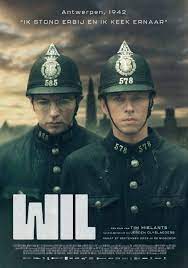
WIL
Belgium/Netherlands, 2023, 110 minutes, Colour.
Stef Aerts, Matteo Simoni, Annelore Crollet, Jean Bervoets, Jan Bijvoet, Pierre Bokma, Pit Borkowski, Jan Declier.
Directed by Tim Mielants.
The Forgotten Battle and Wil can be considered companion films, dramas of World War II taking place in the Netherlands, a focus on the city of Antwerp.
Dramas of World War II continue to be made, quite a vast number of films, ranging over the world. There have not been so many dramas of the Netherlands – there was a surprising film, Betrayed, 1954, with Clark Gable, Victor Mature and Lana Turner, alerting audiences to the war in that part of Europe.
The forgotten battle is that of the river Schelde, late in 1944. The film focuses on the German occupation of the Belgian town, a small underground group, young man taking photos of the Germans, and intentionally causing an accident with the death German soldiers, his arrest, torture, giving information. He is the son of a local doctor. His sister is concerned, close to members of the resistance, offering to take key map to the Canadians who are attacking the Germans, her being captured, her friend, wounded, floating on the boat and discovered by the Canadians. There is a grim battle sequence with the Canadians attacking, many wounded and dead. Then, with the aid of the map and strategy, there is the counter-attack.
Brought into the action of the British, a group of glider pilots, grounded near the village, encountering that is, one escaping and pointing the Canadians in their attack.
War scenes of staged, the audience gets a sense of the German occupation and harshness, and, with one Dutch soldier who had enlisted in the German army, a growing sense of disillusionment, is having to participate in the shooting of the hostages, his participation in the attack.
On the other hand, Wil takes place in 1942, a Belgian town occupied by the Germans, in full control, some of the collaborators in the town, the focus on young police, locals, the strength of their local command and his warnings to the observant, especially in his taught sequence.
Two young policeman are asked to accompany a German to arrest a Jewish family. There is some resistance, the German is killed and his body concealed in a drain. There are consequences for the two, very young, connections with the Resistance, codenames, meetings with the leader, veteran actor Jan Decleir, arrests and torture. They also help the Jewish family to be hidden, and a train journey, being captured.
The dilemma of story is, remembering the Stockholm Syndrome, how much occupied people can identify with the occupiers, moral issues, life and death, silence, support.
The film is ominous, challenging moral stances.
- A World War II story? The city of Antwerp? German occupation? Local police? Persecution of the Jews?
- Antwerp, the 1940s, the city, the streets, homes, police Academy, German occupation? Atmosphere of occupation, deprivation, patrols of the streets, roundup of the Jews? The musical score?
- The title, the focus on Will, his age, his family background, his father working in the bureaucracy, the pressure from his mother? The friendship with A load? The local force, the young recruits, inexperience? Uniforms, drills, meetings? Gene in charge, his advice to the recruits, the singing of the song, observing?
- The situation, the German soldier, asking for an escort, the two men going with him, his attitudes and arrogance, at the Jewish household, the entry, the husband and wife, the daughter, ousted? The treatment by the German? The young men and their reactions? The brutality, Will and his decision, wounding the German, his head wound, putting him in the hole? The aftermath, the secrecy? The psychological and emotional effect on them? The consequent behaviour, with the other police, with Jean?
- Will and Load the German family, rescuing, concealing them, bringing them food? Arranging the documentation? Taking them to the train? The news of the train being waylaid, the execution of the family?
- The anti-Semitic scenes, the cynical, the people fleeing, being chased? Violence?
- Lode, age, personality, friendship with Will, as police, the effect of the experience on him? His family, Will and his visits, the encounter with Yvette, her strong personality, protective of her brother, threatening Will, the family and their welcome, Wills reserve? Cab load and ambiguity of feelings?
- The German authorities, the missing German, the search, interrogation of the police, the rounding up of the Communist, the firing line, the officer in charge, cruel attitude, the killing of the Communist? The two young men, keeping quiet?
- Will and his painting, the patron of the arts, the visit, his anti-Semitic attitudes, his Nazi connections, his offering Will the studio, being a patron? The outings, the bars, drinking? The experience for Will? A citizen of Antwerp that wanting the German supremacy?
- The resistance, the young man and meetings, Will and the influence, meeting the Professor, his inspiration? Yvette? The bonding, the relationship, the effect on each? Going into action, deceiving the Germans?
- The buildup to the confrontation, the German connection, the meeting with Will, his patron, the missing body of the German? The consequences? Threats to Will? To the family?
- The confrontation with the arts patron, his death?
- Will, the pressure from his family, from Yvette? The rest of the professor, his torture, giving up names, Will and his code name of Angel? The brutality of the torture sequences, the Gestapo, the torturer?
- The rest of Jeanar, his resisting the interrogation, Will having to witness, his singing the song and urging Will to be quiet?
- The continued occupation, the dilemma for the citizens, outward loyalties, the resistance? The role of the police? Will maintaining his presence in the police, the reaction of Yvette? The conscience dilemma?
Forgotten Battle, The
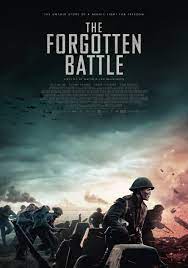
THE FORGOTTEN BATTLE
Belgium/Netherlands, 2020, 124 minutes, Colour.
Gijs Blom, Jamie Flatters, Susan Radder, Jan Bijvoet, Tom Felton, Marthe Schneider, Ronald Kalter.
Directed by Matthijs van Heijningen Jr.
The Forgotten Battle and Wil can be considered companion films, dramas of World War II taking place in the Netherlands, a focus on the city of Antwerp.
Dramas of World War II continue to be made, quite a vast number of films, ranging over the world. There have not been so many dramas of the Netherlands – there was a surprising film, Betrayed, 1954, with Clark Gable, Victor Mature and Lana Turner, alerting audiences to the war in that part of Europe.
The forgotten battle is that of the river Schelde, late in 1944. The film focuses on the German occupation of the Belgian town, a small underground group, young man taking photos of the Germans, and intentionally causing an accident with the death German soldiers, his arrest, torture, giving information. He is the son of a local doctor. His sister is concerned, close to members of the resistance, offering to take key map to the Canadians who are attacking the Germans, her being captured, her friend, wounded, floating on the boat and discovered by the Canadians. There is a grim battle sequence with the Canadians attacking, many wounded and dead. Then, with the aid of the map and strategy, there is the counter-attack.
Brought into the action of the British, a group of glider pilots, grounded near the village, encountering that is, one escaping and pointing the Canadians in their attack.
War scenes of staged, the audience gets a sense of the German occupation and harshness, and, with one Dutch soldier who had enlisted in the German army, a growing sense of disillusionment, is having to participate in the shooting of the hostages, his participation in the attack.
On the other hand, Wil takes place in 1942, a Belgian town occupied by the Germans, in full control, some of the collaborators in the town, the focus on young police, locals, the strength of their local command and his warnings to the observant, especially in his taught sequence.
Two young policeman are asked to accompany a German to arrest a Jewish family. There is some resistance, the German is killed and his body concealed in a drain. There are consequences for the two, very young, connections with the Resistance, codenames, meetings with the leader, veteran actor Jan Decleir, arrests and torture. They also help the Jewish family to be hidden, and a train journey, being captured.
The dilemma of story is, remembering the Stockholm Syndrome, how much occupied people can identify with the occupiers, moral issues, life and death, silence, support.
The film is ominous, challenging moral stances.
- The title, the focus, and its significance for ousting the German occupation of north-western Europe?
- And setting, the Balkan town, occupied, streets, offices, Gestapo headquarters, homes, shops? The local countryside, the water? The German fort? The Canadian headquarters, the attack? The musical score?
- Action in England, the glider pilot, their training, manoeuvres and turning, personalities, friendship, into the war, the speeches, William and his father, the authorities? The flight to Europe, being downed, the group, the wounded leader, carrying him, in the boat, the shelter in the house, decisions, the confrontation with the Germans, the death of the leader, William and his shooting? His escape, his partner reluctant? Joining the Canadians, bonding with them, with Bill, participation in the attack, the aftermath, the assault on the Germans?
- Marina is, Dutch, winning the Germans, the training, being wounded, hospital care, the German officer, no legs, disillusionment, supporting Marina’s, killing himself? Marina is transferred to the town, the desk job, relationship with the commander, his observations, touches of disillusionment, the pang orders, his warning Teun to her brother and the torture, St battle, shooting the hostages and his it, the machine gun fire, the retreat, defending Teun, his being wounded, her tending to him, his death?
- Dirk, 17, it is, throwing the stone, and the windscreen, the killing of the Germans? Some of the doctor, the two Tuen, arrested, his father pleading against the death multi-, imprisoned, tortured, giving information, the arrest of the resistance, in the truck, his father being him leave, shot?
- Tuen, her work in the office, up with a view to the Germans leaving, destroying documents, her friend Jana, the resistance? The issue of Dirk’s photos, strategic value, discussions with Janet, opening her brother’s release, giving them after his death? The response of the resistance, the explanation of the strategy for the Canadians? The situation to get access for British ships to Antwerp Harper?
- The request for the map, Tuen taking them, the wounded resistance leader, the appeal to the women, Chewing her green, going with Janet, under cover of dark, the boat, Janet wounded, but with the maps, floating away, due and being captured, held?
- The Canadians finding the boat, the maps, the plan to strategy?
- Success against the Germans, the retreat, Turin in prison, Marina is helping her, wanting her assailant, his being wounded, attending him? And her moving away with the troops towards liberation?
Fallen Leaves/ Kuolleet Lehdet
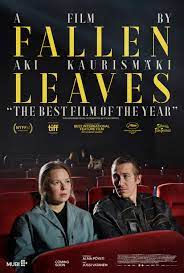
FALLEN LEAVES/ Kuolleet lehdet
Finland, 2023, 81 minutes, Colour.
Alma Poysti, Jussi Vatanen, Janna Hyytiainen, Nuppu Koivu.
Directed by Aki Kaurismaki.
Technically, the title should be translated: Dead Leaves. And, as so many songs are played throughout the film, a range of popular and familiar songs, local Finnish songs, with lyrics which correspond to the characters and action, audiences might have been expecting the 1950s song, in English Autumn Leaves (and memories of Nat King Cole, with Edith Piaf singing it in French). In fact, this is sung during the final credits and the information given that it is originally a French song – and Dead Leaves.
But, Fallen Leaves does justice to the two central characters and their relationship.
This brief film, just 80 minutes, comes from celebrated Finnish director, Aki Kauarismaki, a dominant figure in the cinema from Finland, along with his brother, Mika, ensuring that world cinema was aware of Finland from the 1990s to the present. At first, especially with his eccentrically titled films and videos, Leningrad Cowboys, he communicated a wry Scandinavian sense of humour and irony. But, as the years passed, he started to embrace more serious themes, films in competition in festivals like Cannes, winning the Grand Jury Prize and the Ecumenical Award in 2002, for The Man Without a Past.
While the director kept his wry tone, he moved into more serious films over the last 20 years, social concern films, with the influx of refugees from the Middle East into Europe in the mid-2010s, his 2017 Other Side of Hope, and Finland’s response to these refugees was irrelevant and telling drama.
Compared with these films, Fallen Leaves is much smaller, more straightforward, minimalist in its cinematic style. It introduces us to two lonely people, Ansa working at the supermarket, checkout, shelf-checking, going home alone at night. And there is Holappa, construction worker, depressed, a drinker. While the screenplay shows details of each of their lives, it gradually brings them together, at a karaoke bar, at a cinema (where we see posters of films that the director obviously admires, their watching Jim Jarmusch’s, The Dead Don’t Die, discussions under a prominent poster of David lean’s version of Noel coward’s Brief Encounter).
There are some sad moments, searching, new discoveries, hopes, falling out, new resolutions. The leaves might have fallen but, here, they are not dead.
- The work of the writer-director, for more than 40 years? Emblem of Finnish cinema? The initial ride comedies, observations on Finland, the change to more serious themes?
- The title, the song, Autumn leaves, made during the final credits? The tone?
- Finland in the early 2020s, Helsinki, apartments, workplaces, supermarkets, building sites, the British cinema, diners, hospitals? Authentic feel?
- The range of music, the range of songs, Schubert, Tchaikovsky, Rock, contemporary songs, mambo Italiano…? Placement throughout the film, setting a tone? And lyrics, especially the said once, illustrating the feelings of the two?
- The director, love cinema, going to see the vampire film, Only The Dead I, the comments about breasts on and got it, the range of characters in the background, especially Brief Encounter?
- The introduction to And the, at the checkout counter, her friend and the change when, at home, alone, the meal, the radio, commentary on Ukraine, music? Going out to the karaoke with her friend, noticing Holappa, not talking? Throwing used by goods into the rubbish, the security guard, her being held up, the baggage, the answers to the supervisor, is strictness, the other women, taking goods, their solidarity, walk out? The computer and €10? Going to the pub, employment, hard work, washing up, seeing the money deal, the owner being arrested, no pay? Her getting job in the building site, hard work? Alone?
- Holappa, on the building site, sharing the building, is continued drinking, depression, his friend, their interchanges, persuaded to go to the karaoke, noticing Ansa, not speaking? The later encounter, going to the film, no names, giving her phone number, her sitting on the phone, waiting? His searching for the number, going back to the cinema, waiting, the number of rats, noticing? Eventually meeting, the invitation to dinner, her buying the actual plates and cutlery, preparing the meal, his arrival, bringing the flowers, the sparkling wine, the meal, his comment about the drinking, the clash about the drinking, his leaving, not taking orders, her not wanting an alcoholic – memories of her father and brother, the death of her mother?
- The Gap, her disappointment, talking with her friend? Holappa and his drinking on the job, the mistakes, followed, moving out, talking with his friend?
- Langley, by itself, the decision to stop drinking, pouring out the alcohol, earning Ansa, her accepting him, his getting the code looking the part, hit by the train? The answer and her looking out the window, forlorn?
- A meeting the friend, giving him the contact for her friend? The news of Holappa in hospital? Her going to visit, the coma, reading, speaking, friendly with a nurse is coming out of coma, the clothes from the nurse, her meeting him, his crutches, and walking away – to a future?
Kardec
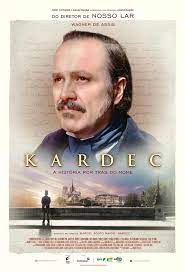
KARDEC
Brazil, 2019, 110 minutes, Colour.
Leonardo Medeiros, Sandra Corvelino, Christian Baltauss.
Directed by Wagner de Assis.
One hand, this is a period piece, friends in the 1850s, Paris. On the other hand, it is the portrait of a French educator who became the champion of spiritism. And, it is a Brazilian production, spoken in Portuguese – English language productions having no difficulties in presenting French dramas with characters speaking in English but unusual to have them speaking Portuguese!
There is great attention to period, costumes, decor, the buildings of the time (and computer expert and imitating modern buildings from the locations). Five days of production in France, the rest in Rio de Janeiro.
For audiences coming onto this film without preparation, may be taken aback at the portrait of Professor Ravail, a noted educationalist of the period, putting into practice theories of education writers, especially the rapport between teacher and student, illustrated in an opening sequence. But, then a priest arrives, demanding to teach Catholic catechism, ousting the Professor.
Ravail was something of a Renaissance man, involved in all kinds of scientific surprises, financial issues. However, as the unusual opening sequence indicates, hands on the circular table, rising into the air and spinning, interested in the phenomena of seances and spirits, and a dramatic experience for himself, contact with a spirit and a sense of destiny in philosophising about spiritism, exploring the existential and some theological implications in his writings.
Leonardo Medeiros is genial as the professor, becoming known as Allan Kardec, his nom de plume. He bonds very much with his supportive wife who, when he is finally arrested, takes on his cause.
There is continued criticism from those who do not believe in this Spiritism, from government officials interpreting his reflections and is subverting law and order, continued for Spiritism from the church.
There is a significant scene with a General, his sense of failure, despair, standing on a Paris bridge, Professor trying to persuade him not to jump but handling it all in a rather cerebral manner – and, the General jumping.
For those interested in Spiritism in the 19th century and its subsequent influence on a number of thinkers and writers, there will be much to appreciate. For those not interested, for those who are particularly critical and disbelieving, they may find it too much of propaganda.
So, it is something of a curiosity item.
Lift
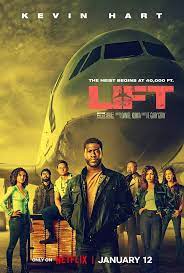
LIFT
US, 2024, 107 minutes, Colour.
Kevin Hart, Gugu Mbatha-Raw, Sam Worthington, Vincent D[Onofrio, Ursula Corbero, Billy Magnusson, Yun Jee Kim, Jean Reno, Jacob Batalon, Burn Gorman.
Directed by F. Gary Gray.
Lift is a lighthearted, serious escapade action adventure. It has been directed by F.Gary Gray, skilled in this kind of entertainment like the remake of The Italian Job.
The main surprise of the film is Kevin Hart in the leading role, the action hero. His delivery and speed is rather toned down from his usual action comedies. And he seems to be enjoying himself as a romantic hero with the criminal touch.
In fact, the film has quite an extensive international cast, British Gugu Mbatha-Raw as an Interpol officer, Australian Sam Worthington as her boss. And, in the supporting cast, Americans, Koreans, Latin Americans – and, a veteran French villain, Jean Reno.
And there are some attractive and exciting international locations, opening with an art heist in Venice.
That the core of the story is Interpol’s desperation to catch Kevin Hart and his gang, getting Gugu Mbatha-Raw to be part of the impossible heist of a cargo of gold, being transferred to Switzerland to the villain so that he can finance terrorists to his financial gain.
The gang is a motley crew, international, hackers, safe crackers, and a gentleman who can disguise himself and infiltrate situations, played by Vincent D’Oonfrioi. Part of the enjoyment is their working together, personalities, clashes, expertise, and/or combining to capture the gold.
And, of course, there is a romantic touch because the Interpol agent and the leader had been romantically involved in the past, leading to tensions, and the breakdown of tensions, especially with the success of the mission.
One of those lavishly produced action adventure pastimes.
- Action entertainment? International, exotic, and impossible highest…?
- The international cast, Kevin Hart more subdued, criminals, interval, villains?
- The tone, the sequences in Venice, the introduction to Cyrus, his abilities, artworks, his team, the techniques of stealing?
- The portrait of the team, international, personalities, talents, seeing them in action, execution of the robberies, the planning and their expertise, the final heist of the gold? Camilla as the pilot, Magnus as the safe cracker, Mi-Sun as the hacker, Denton, the aged gentlemen, his many disguises?
- Interpol, the organisation, Gladwell and her role, her commitment, Huxley as the boss, Australian accent, demanding, seeing him in pursuit, the chases, failure, his determination, demands on Gladwell?
- The situation, the arch criminal, wealth, Switzerland, Gold, supporting terrorists, his staff, the range of thugs?
- The plan, Gladwell to go undercover, her previous relationship with Cyrus, their sparring, her meeting with the various members, reluctance, commitment, the various details of the planning?
- The flight, arrangements with the plains, hacking, deceptions, alternate plans, hacking, the safe on the plane, getting the gold? The various steps, tensions, action sequences, in the air, on land?
- The buildup to the confrontation, the criminal, assured, the authorities, the failure of his plot?
- The group, bonding, the success, Cyrus and Gladwell – and the possibility for sequels?
Force of Nature/ Australia
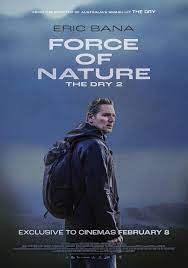
FORCE OF NATURE
Australia, 2024, 120 minutes, Colour.
Eric Bana, Anna Torv, Deborra-Lee Furness, Robin McLeavy, Sisi Stringer, Lucy Ansell, Jacqueline McKenzie, Jeremy Lindsay Taylor, Richard Roxburgh, Tony Briggs, Kenneth Radley, Archie Thomson, Ash Ricardo, Ingrid Torelli, Matilda May Pawsey.
Directed by Robert Connolly.
Novelist, Jane Harper, has had considerable success, critical and popular, with her detective stories featuring Federal Police investigator, Aaron Falk.
On screen, writer-director, Robert Connolly (Balibo, Blueback) directed Jane Harper’s novel, The Dry, popular with Australian audiences – and overseas. It introduced Eric Bana as the detective, in the desert outback of Northwestern Victoria, the complexities of life in the town, family relationships, murder.
While Force of Nature is advertised in the media as The Dry 2, that subtitle does not appear in this film at all. In fact, the temptation must have been to call this investigation The Wet or The Damp (not attractive marquee titles). Rather, there is the force of nature in the mountain terrains where the action takes place, filmed in the Otway Ranges, the Dandenongs just outside Melbourne, the Yarra Valley. And, the scenery is often beautiful, moments breathtaking, mountains, forests, valleys, creeks, waterfall.
The occasion for the action is one of those team-building retreats popular with some corporations. This time there is a focus on a group of women employees in an international company which, in fact, is under investigation by the Federal Police, donations to charities but also the funding of human trafficking, money-laundering… An the face of the company for the film is veteran, Richard Roxburgh.
However, it is his wife, played by Deborra Lee Furness, strong-minded, employing the women, testing them, leading them out into the mountains, wanting to bind them together. But, at the film’s opening, Aaron Falk receives a phone call from one of the team members, cut-off. The audience then sees some of the members of the group emerging from the bush, onto a road, hailing down traffic, but the revelation that one of the team is missing, the woman who made the phone call, Alice.
The screenplay for the film, by Robert Connolly, parallels the structure of novels, bringing one episode to a climax or moment of tension, then moving to another aspect of the story, then another, and back, developing the narrative, creating issues because this is a police investigation.
We are invited to concentrate on the women on their walk, their personalities (well developed for our understanding of them), bonding, clashes, getting lost, struggling in the dark, finding an abandoned hut (and the screenplay indicating a story of a serial killer in the bush 40 years earlier). While Jill, the leader, is a strong personality, the focus is on Alice, played by Anna Torv (reminding audiences that she can play dominating, tormented, sometimes self-doubting characters as in her award-winning performances in The Newsreader).
There is also the threat of plot with Alice, an informant to the Federal police, financial difficulties of her own, pressured to get information on the company, clashing with her close friend, Lauren, also on the trek, and their daughters both going to the same exclusive school. When Alice disappears, her friend spent a lot of time standing on the top of a fast waterfall, looking and hoping for her return.
But, keeping it all together is the investigation by Aaron Falk, Eric Bana once again an engaging screen presence, supported by a tough Jacqueline McKenzie as his partner. What enhances his presence is a stream of flashbacks to his boyhood, accompanying his enthusiastic bushwalking parents into the mountains, learning a great deal about bushcraft, the stars and directions, searching for his mother after an accident in the bush, standing in for in good contribution as the search for Alice proceeds.
As with all good mysteries and investigations, there are some unanticipated twists in the plot – but, the audience sporting a clue halfway through and wondering where it will lead, unexpectedly bringing the investigation to a satisfying conclusion.
- The popularity of Jane Harper’s novels? The impact of the film version of The Dry? This story as a stand-alone story?
- The title, the visualising of nature, mountain ranges, hills and valleys, treason paths, rivers and creeks, waterfalls, the seasons, rain, storms? The musical score?
- A federal police investigation story, the role of Aaron Falk, audience knowledge of him from the previous film? Eric Bana and his screen presence and performance? The focus on him and his work, partnership with Carmen, no personal background story? The contrast with the back story of his childhood, his travels in the mountains and forests, drawing on his learning and experience, his father teaching him, the support of his mother, his mother lost, the accident, finding her, the rescue, hospital? His finally telling the story to Carmen? His background enabling him to help in the search to find Alice?
- The corporate business story, the role of Alice, the desperate phone call from the mountains, her work in the company, stealing the money, paying for her daughter’s education at the privileged school, Aaron and Carmen and their hold over her, her filming the documents, the meetings with the two, her fears, resistance, the fact of the filming, the USB stick, her going on the retreat, the meeting with Daniel and the misinterpretation, his wanting the information from her, her dominating personality, bullying, disagreeing with people wanting her own way, hiding the USB stick? Her relationship with Lauren, the past, school, their daughters, the bullying, Lauren and the clash, Alice not apologising, the attack, Alice hitting her head, her death?
- The retreat story, the company, Jill as leader, hiring Alice, keep an eye on the staff, hiring Bree and Beth, the retreat for team making and building, her personality, her relationship with her husband, suspicions about Alice, her role in the retreat, leadership and decisions?
- Daniel, the company, charities, money-laundering? His presence, the meeting with Alice? Suspicions? Not wanting Jilll to talk to Aaron without a lawyer? Jill talking, their secret? His final confrontation with Aaron, the role of the police, Aaron and his hostility, and the final victory with the recovery the USB stick?
- The intercutting of the women, the trek, the manager, his leadership, the information about the tracks, the flags on the trees, the nightly shelters and provisions? The portrait of the women, Jill and her leadership, Lauren and her experience, Alice and her domination, always quibbling, expectations, the two sisters, the revelation about Beth and the drugs, stealing from her sister, the revelation that her sister informed the police, Bree and her moving the body, thinking that Beth had killed her? The funnel-web attack? The women and their secrecy, Lauren standing at the waterfall waiting for Alice to come back? The two sisters, one thinking the other guilty? Jill and supplying information? The visualising of the fight, Jill being punched, Alice and her leaving, the revelation of the confrontation with Lauren, the phone call to Aaron? Her death? Her relationship with her daughter?
- The intercutting of all the themes, the local police, traditional methods, finding Aaron intervening? His skills, connecting with the camp organiser, the story of the serial killer and his victims, the women finding the hut, the dog’s burial, the mound? Aaron, finding the hut, burial place, and consolation for the families of the victims of long ago?
- The pieces all coming together, the business aspects and the USB stick and the federal police investigating Daniel in the company? Lauren and her fall over the waterfall, Aaron rescuing her? Taken into custody? Her future? The two sisters and the reconciliation? The two daughters and their future?
- A satisfying blend of a variety of themes and stories and strong delineation of characters?
Bob Marley: One Love
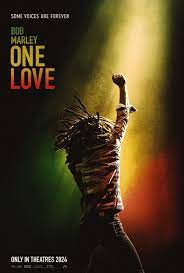
BOB MARLEY: ONE LOVE
US/UK, 2024, 104 minutes, Colour.
Kingsley Ben-Adir, Lashana Lynch, James Norton, Anthony Welsh, Nia Ashi, Michael Gandolfo, Quan-Dajai Henriques.
Directed by Reinaldo Marcus Green.
Bob Marley (1945-1981) was a significant figure in 20th-century music, the album, Exodus, considered one of the greatest of the century. But Marley was also a significant figure in terms of politics and peacemaking. And, a native of Jamaica, he was a committed Rastafarian.
For those who know Bob Marley and his music, this is an opportunity to be reminded of his story, hear excerpts from many of his songs, see performances. The action takes place between 1976 and 1978, his first attempt at a concert for peace and the union of clashing parties in Jamaica, an attempt on his life, his moving to London, his work with his band, the Wailers, recordings, success, tours, then his return to Jamaica and the celebrated peace concert with the two clashing political leaders on stage with him.
Those who are not familiar with Bob Marley and his music, probably best to do a bit of checking before seeing this film, some Googling, and also finding out a bit about the spirit of Rastafarian beliefs, its beginnings in Jamaica, its spirit and spirituality, the link with the Emperor of Ethiopia, Haile Selassie.
One of the great strengths of this film is the range of songs included, the rhythms, the lyrics.
British actor Kingsley Ben-Adir (remembered by many in 18 episodes of the as coroner, Marcus, then as one of the prominent Kens) enters fully into his performance as Marley, an intense impersonation, is a character, in his relationship with his wife, Rita (Lashana Lynch), with his children – and one of his children, glimpsed in the film, Ziggy Marley, acted as producer of this film (and there are many Marley is in the final credits).
There are flashbacks to Marley’s childhood, his absent white father, his mother, poverty and growing up, his talent for music, the initial encounters with Rita, and early success with his band, recordings. During the action of the film, Marley is in his early 30s, a touch of the mystic, a touch of the roving eye, consumed by the political situation in Jamaica, an attack on his life, a shooting attack on Rita, violent gangs (and a later scene where his assailant asks forgiveness).
James Norton appears as friend, adviser, connection with the record industry, promoter of concerts. At times, in Europe, Marley seems to be lost in the social swirl associated with his fame and concerts. But, ultimately, the return home, peacemaking.
Marley love playing football and suffers an accident, an infected toe, melanoma, cancer complications and his death at 36.
An attempt to honour Marley but, in comparison with other films about musicians and celebrities, this one is rather slighter, briefer.
- Popularity and status of Bob Marley? In his time? Later? Music, politics, peace? Status in Jamaica, worldwide?
- Audience knowledge of Bob Marley and his life and career? The information given at the beginning? Flashbacks to his past? 1976-1978, political upheaval, peace concert, attempt on his life, the time in London, recording, success, tours and concerts, lifestyle? Return, the peace concert in 1978, the two Jamaican leaders on stage? Information about his cancer and death?
- Kingsley Ben-Adir as Bob Marley, impersonation, songs, lip syncing? Personality?
- Bob Marley and his background, white father, black mother, hard upbringing, Trench Town, talent for music, the encounter with Rita, the bonding, sharing, his music? The adult Bob Marley, Rastafarian and explanations, astral, beliefs, the touch of mysticism? His music, West Indian, reggae, incorporating various strands? Recordings, success, concerts and performance? His personal life, relationships, the bond with Rita, her role as backup singer, the children, the dangers, joining him in London, the tours, the clashes, reconciliations?
- The overall impression of Bob Marley, as a person, qualities, intentions, demands on musicians, composer, performer, father, husband, political influence?
- Rita, her personality, the past, the attempt on her life, hospital, Bob spiritual, her recovery, coming back for the concert, the dangers, the threat to the children, coming to England, performance, the money changing for the African tours, the clashes with Bob, the lifestyle with the rich and famous, reconciliation, the return, the children, the final concert?
- The Wailers, the personalities, musical school, interactions with Bob, calling him Skipper, performances? Dangers? The tours?
- The world of managers, Chris and his friendship, the dangers in Jamaica, contacts in London, discussions about themes, the issue of Exodus, the cover designs, the final simple design, discussions with the producers, tours, logistics, performance, social meetings?
- The overall effect on Bob Marley, religious point of view, reading about Haile Selassie, the Rastafarian tradition, the touch of mysticism?
- The joy of playing football, the musicians, Bob, the accident, his infected toe, the cancer, discussions with the doctors, urge to see doctors? His early death?
- The effect of learning about Bob Marley and his role in Jamaica, peace? The impact, still, of his music?
Vanya
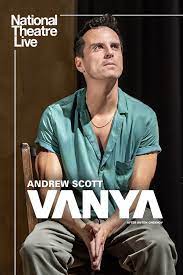
VANYA
UK, 2023, 100 minutes, Colour.
Andrew Scott.
Directed by Sam Yates.
This is a filmed version of a celebrated theatrical performance by Andrew Scott in a contemporary version of Anton Chekhov’s Uncle Vanya.
For those not familiar with the plot of Chekhov’s famous play, it would be recommended to check out a synopsis, a general impression of the drama, the characters and their interactions so as to be able to identify the characters here, generally with Chekhov’s names but Marina becoming Maureen, for instance, and references to Ivan more than Vanya.
And, the setting is transferred from Russia to an estate to Ireland, a farm, Ivan/Vanya the manager, his relationship with his niece, Sonia, his response to his uncle, the pompous filmmaker, Alexander, with his new younger wife, Helena, who is the object of attraction by the local doctor, Michael. There is also the local friend, Liam and his wife.
Identifying the characters is important because the key aspect of this theatrical piece is that Irish actor, Andrew Scott, plays all the roles. It is a very impressive tour-to-force, Scott alone on stage, altering his voice, establishing mannerisms, stylised movement to indicate characters, the use of his body and limbs to indicate different characters, stances, walking, from Scott who is simply dressed in shirts and trousers and shoes.
As well as the acting, Scott has to do quite an amount of stage business throughout, lights on and off, going into cupboards and out, a gimmick to indicate a wolf whistle, boiling the kettle, cup of tea, bottle of alcohol and continually lighting up…
For Chekhov lovers, the noticing of the parallels and adaptations will be intriguing. For those not familiar with Chekhov, it may be quite an effort to follow the whole play and its thrust, its themes of age, regrets, loves and relationships, vanities, the range of the faults and foibles of human nature.
For those watching Vanya on streaming, it may be helpful to turn on the subtitles – which indicate which character is actually speaking.
So, whether Chekhov and Uncle Vanya are familiar or not, this hundred minute piece is well worth seeing to be amazed at the talent and skills of one actor holding the stage. While the audience is shown and audience applause is heard, audiences watching this film version will be glad that they are seeing close-ups of Andrew Scott and his performance, enhancing the intensity and communication.
Blond One, The/ Il Rubio
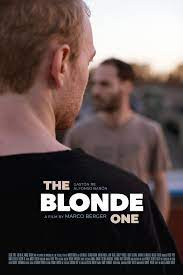
IL RUBIO/ THE BLOND ONE
Argentina, 2019, 117 minutes, Colour.
Gaston Re, Alfonso Baron, Melina Irusta, Charlie Velasco.
Directed by Marco Berger.
Il Rubio literally means the Blond One.
This is a drama from controversial Argentinian director, Marco Berger. He attained some international fame and notoriety with his drama, Taekwondo, the gathering of group of men and some women at a resort, their time together – especially with homoerotic undertones and overtones. He repeated this theme to a larger extent, sometimes more graphically, often exaggeratedly, in his 2021 film, Horseplay.
By comparison, this drama is very quiet, more intense, more thoughtfully written and performed.
The subject is a gay relationship in the context of Argentina at the beginning of the 21st-century. It opens, with a touch of Taekwondo, with a group of friends, fellow workers, gathering together, watching television, football, the comments, gradually revealing some of the characters, especially Juan, who works on a building site, who is known to have a girlfriend who visits regularly. On the other hand, he is renting one of the rooms of the lodging to a fellow worker from another town, Gabriel, very quiet. He is the Blond One.
Berger relies for his communication of feelings very much on close-ups, all throughout the film, close-ups of faces, juxtaposition of faces, suggesting closeness to leave the school is in standing, travelling in public transport, the school is close-ups of fairly explicit sex scenes.
Taking this for granted, we explore the tentative, tentative touching, relationship developing between Juan and Gabriel, Gabriel taking something of a quiet initiative, Juan responding, both acknowledging their sexual orientation but Juan not wanting it to be known, continuing his relationship with his girlfriend who becomes pregnant, Gabriel rather silent, often withdrawn, moody.
Gabriel’s wife has died suddenly leaving him with his young daughter who stays with Gabriel’s parents in the town. The scenes between father and son, with his mother also, have a liveliness and vitality and charm.
When Juan entertains some visitors from his childhood, there is a suggestion of a relationship with one of them, disturbing Gabriel, who broods. While Juan wants to continue his double life, it is sometimes too much for Gabriel.
Ultimately, when Juan girlfriend is pregnant, he asked Gabriel to leave to make the room available for the baby, a parting, and the finale with Gabriel back with his daughter.
In terms of the dramatising of a gay relationship, this is a quietly intense film, illuminating the two personalities, their drives, helping us to understand the nature of the love, the psychological repercussions, the consequences for the men’s lives.